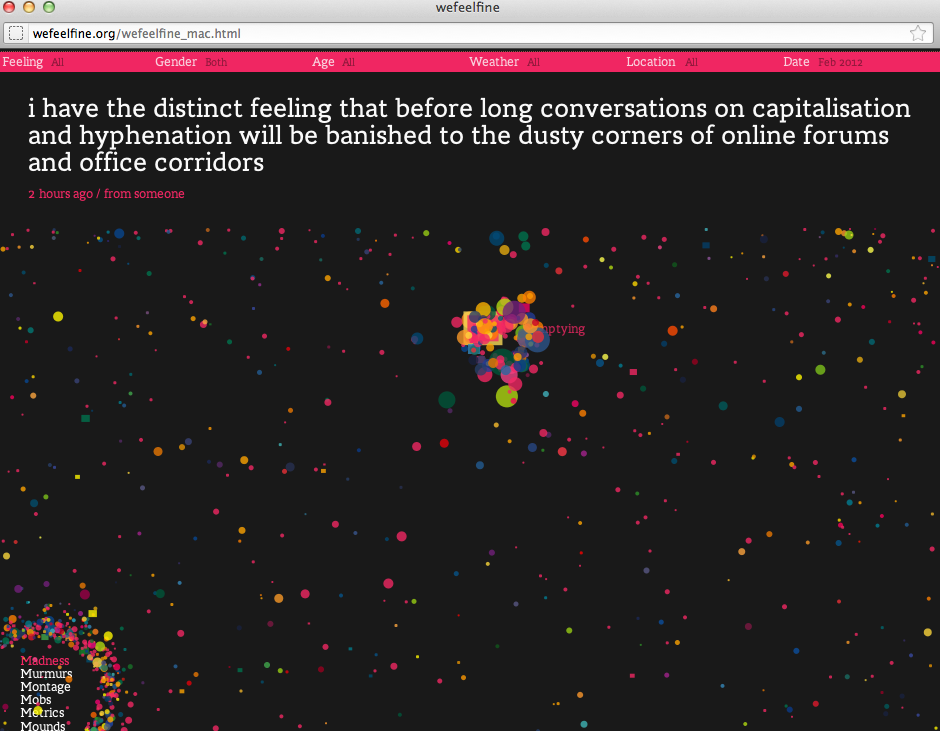Is the Internet a Space?
The other day a conversation turned towards the notions of "online" and "digital" and the question whether the Internet is a space or not. The person I was speaking to did not believe the Internet can be perceived spatially, while I took the opposing side. We often forget that the internet is not a purely virtual entity - there are physical spaces as well as networks that actually power this online "universe". To get a better idea, check out the visualization in the video below, when Sergey Brin, here speaking alongside Larry Page, co-founders of Google, presents a mapping of Google usage and networks in real time, which they actually use in Google's offices. Brin points out that fibre optic networks and satellites are absolutely necessary in facilitating the transmission of data between places.
His 2006 work, We Feel Fine (2006), was an applet Harris created with Sep Kamvar. An applet that has been harvesting human emotions on the internet since 2006, it then organizes these harvested emotions via various interfaces. When you connect to the applet (shown below), a swarm of dots in various colours each represent different emotions. Below was a search for "all emotions" in February 2012. Clicking on one dot, the below quote came up.
The visualization of individual utterances of people connected by feelings makes We Feel Fine, as Harris notes, an art project created by "everybody" and the coding to create the applet is available on the project website under the Creative Commons. S
Somehow, We Feel Fine visualizes bodies in space, virtualized, but representative of bodies nonetheless. Of course, that would be most true in a search created specifically for the month and year you are searching, as you then exclude those "bodies" that no longer exist, either in the virtual or the physical world. The deceased, in other words, who are becoming a real pertinent issue in the debate surrounding the Internet realm. In fact, this month, new legislation that deals with what to do with the online accounts and profiles after someone dies has been tabled in Nebraska. This new legislation is an interesting one in that it proposes to include Facebook accounts into the deceased's estate plans - technically, their Facebook profile would then be rendered "property" . Would that then confirm that the Internet is being treated in "spatial" terms? Think about Second Life!
In the end, the question still stands: is the Internet a Space? And saying that, what is the difference between "online" and "digital"? Looking at Harris's work, We Feel Fine touches on the distinction between "online" and "digital" in that "online" might be posited to be the virtual milleu - the format or the space - within which digital matter exists as form?
Somehow, We Feel Fine visualizes bodies in space, virtualized, but representative of bodies nonetheless. Of course, that would be most true in a search created specifically for the month and year you are searching, as you then exclude those "bodies" that no longer exist, either in the virtual or the physical world. The deceased, in other words, who are becoming a real pertinent issue in the debate surrounding the Internet realm. In fact, this month, new legislation that deals with what to do with the online accounts and profiles after someone dies has been tabled in Nebraska. This new legislation is an interesting one in that it proposes to include Facebook accounts into the deceased's estate plans - technically, their Facebook profile would then be rendered "property" . Would that then confirm that the Internet is being treated in "spatial" terms? Think about Second Life!
In the end, the question still stands: is the Internet a Space? And saying that, what is the difference between "online" and "digital"? Looking at Harris's work, We Feel Fine touches on the distinction between "online" and "digital" in that "online" might be posited to be the virtual milleu - the format or the space - within which digital matter exists as form?


 RSS Feed
RSS Feed